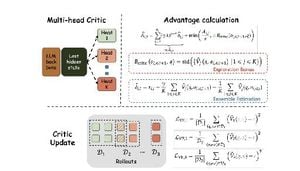Texas is set to revolutionize its recycling efforts with the proposed implementation of a deposit refund system (DRS), following the successful models seen across northern Europe and various states like Iowa and Michigan. This innovative approach is believed to drastically reduce the heaps of trash filling landfills and sprawling across the scenic Texas landscapes, effectively utilizing public participation to turn littering on its head.
Research from Texas A&M University reveals startling statistics: among the 23.7 billion beverage containers sold throughout Texas last year, only about 5.2 billion were recycled. According to Raymond Robertson, director of the Bush School’s Mosbacher Institute for Trade, Economics, and Public Policy, “We are importing trash that's completely unnecessary.” This observation could change if Texas adopts the DRS model, which incentivizes recycling by charging consumers a small fee at the point of sale and refunding them upon return of the container.
Such systems not only curb waste but also bolster local economies. A quick glance at the numbers reveals the potential impact: Texas could reclaim about 18.5 billion containers, which were otherwise left to deteriorate or become litter, with enhanced recycling efforts leading to the creation of new jobs and generating substantial revenue for the state. Kaleb Abreha, assistant research scientist at the Mosbacher Institute, firmly believes there’s both environmental and economic rationale behind adopting DRS.
The state's current recycling system is hampered by inefficiencies, particularly single-stream recycling methods laden with contamination issues. With under one-fifth of plastic bottles currently leading to recycling, the implementation of DRS could turn these numbers around. Research shows deposit states recycle 46% of their plastic water bottles, compared with just 10% for non-deposit regions. This scheme, emphasizing financial returns for participation, prompts significant public involvement.
To assemble this monumental shift, retailers will play a pivotal role. Store owners must be willing to accept returned containers, which might seem burdensome initially. Harris advises, “The single best way to increase returns is for retailers to accept returns.” Understanding the benefits for sales could composite the real incentive. Each patron returning containers brings revenue opportunities for shops, evidenced by the practice seen with bottle deposits.
Efforts to establish this DRS program face hurdles, primarily focusing on the availability and affordability of virgin plastics. Companies often opt for lower-cost newly produced plastics over recycled options. Robertson notes, “They say it on the bottle, ‘this bottle is made with recycled content,’ but they don’t always tell you where it came from.” A salient revival of Texas’s recycling game hinges upon overcoming public confusion surrounding recycling processes, which complicates coordination efforts.
Meanwhile, transitioning service members at Fort Leonard Wood are poised to benefit from increased career opportunities. The Transition Assistance Program (TAP) is collaborating with the Education Services Division to host its first combined Career and Education Fair on February 27, showcasing more than 35 employers across various sectors: healthcare, security, and law enforcement included.
Walter Harris, TAP's transition services manager, highlights the fair's unique significance. “We have various employers scheduled to attend,” he stated, underscoring its suitability for not just transitioning servicemen and women but also veterans, retirees, and Army civilians—everyone can benefit from the fair, featuring education institutions and vendors to support career development.
Offering attendees educational and occupational pathways, the fair encourages job search readiness. Harris recommends participants arrive dressed for success, prepared to showcase their skills through resumes and even immediate interviews. Schools and recruiters also feature pivotal roles, with over 20 institutions attending—to aid service members with higher education goals.
But not all community initiatives focus on employment and urban cleanliness; Somerville, Massachusetts, is taking pragmatic steps toward pest control. The city is currently participating in the Rodent Fertility Control Study, leveraging Evolve—a hormonal solution aimed at curbing rat reproduction without the use of harmful poisons. With traditional poisons endangering local wildlife, this humane alternative promises long-term applicability.
Somerville encourages residents with properties around Lincoln Park to engage. Residents can join this initiative by permitting bait stations on their property at no cost, serving as key players in this experiment. Field volunteers are also being recruited—a proactive means to engage the local community.
Identifying the ramifications of this study could lead to safer pest management practices and transparency around municipal pest control efforts. “This study builds on existing rodent control strategies,” city officials noted, emphasizing multifaceted approaches starting from surveillance to educational outreach.
Community engagement is at the core of these varied initiatives. Be it promoting recycling, supporting stable career pathways for service members, or innovative pest control strategies, each program exemplifies the power of active participation and forward-thinking solutions. The combined efforts not only bolster local economies and environments but significantly empower residents to take charge of their communities with creative initiatives.



